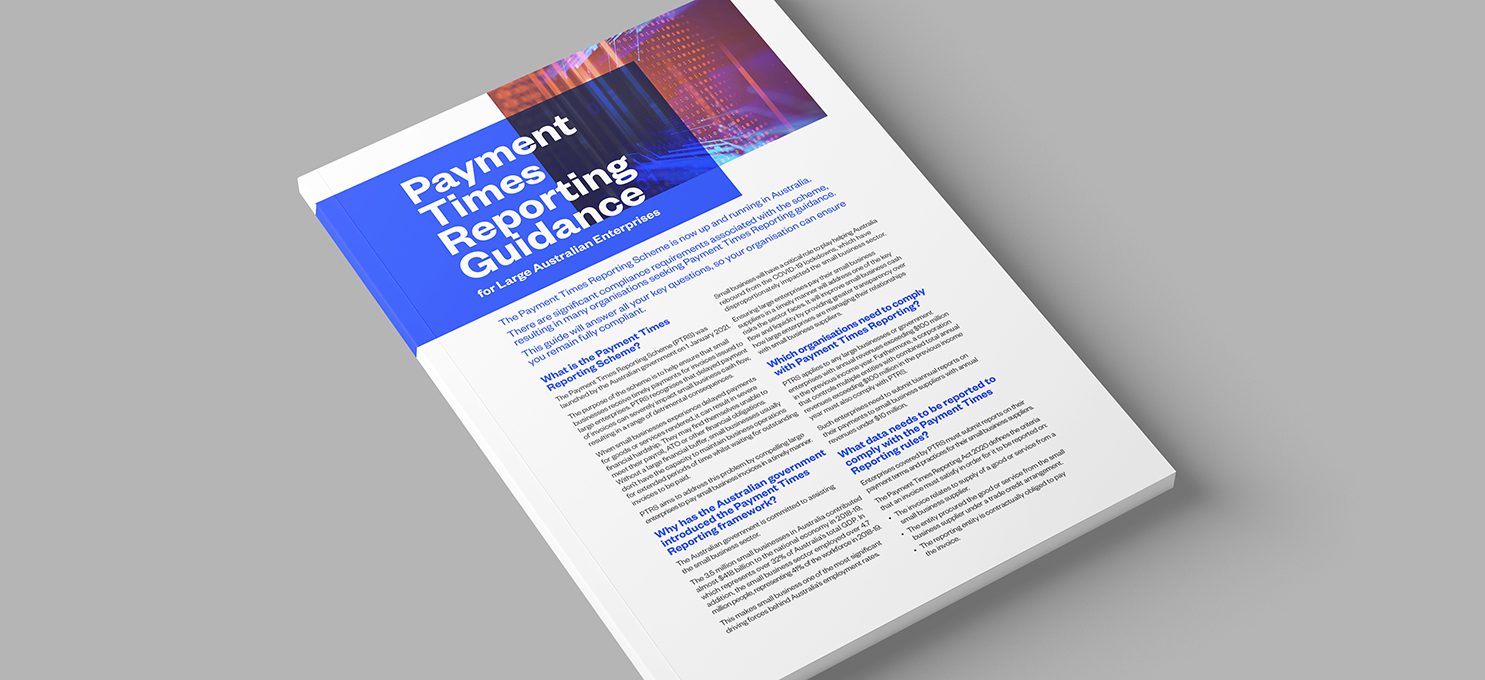A CFOs Guide to ACH Payments
In recent years, the banking industry has undergone significant transformations that have changed how we manage our finances. The shift from traditional …
The Payment Times Reporting Scheme (PTRS) is now up and running in Australia.
There are significant compliance requirements associated with the scheme. The complexities of the requirements may be a burden for some organisations. They may impose significant inefficiencies on Accounts Payable departments.
This guide provides you with essential PTRS guidance. It seeks to answer all your key questions to help your organisation meet its compliance obligations. Learn how integrating eftsure into your accounting processes can make complying with PTRS substantially easier.
The Payment Times Reporting Scheme (PTRS) was launched by the Australian government on 1 January 2021.
The purpose of the scheme is to help ensure that small businesses receive timely payments for invoices issued to large enterprises. PTRS recognises that delayed payment of invoices can severely impact small business cash flow, resulting in a range of detrimental consequences.
When small businesses experience delayed payments for goods or services rendered, it can result in severe financial hardship. They may find themselves unable to meet their payroll, ATO or other financial obligations. Without a large financial buffer, small businesses usually don’t have the capacity to maintain business operations for extended periods of time whilst waiting for outstanding invoices to be paid.
PTRS aims to address this problem by compelling large enterprises to pay small business invoices in a timely manner.
The Australian government is committed to assisting the small business sector.
The 3.5 million small businesses in Australia contributed almost $418 billion to the national economy in 2018-19, which represents over 32% of Australia’s total GDP. In addition, the small business sector employed over 4.7 million people, representing 41% of the workforce in 2018-19.[1]
This makes small business one of the most significant driving forces behind Australia’s employment rates.
Small business will have a critical role to play helping Australia rebound from the COVID-19 lockdowns, which have disproportionately impacted the small business sector.
Ensuring large enterprises pay their small business suppliers in a timely manner will address one of the key risks the sector faces. It will improve small business cash flow and liquidity by providing greater transparency over how large enterprises are managing their relationships with small business suppliers.
PTRS applies to any large businesses or government enterprises with annual revenues exceeding $100 million in the previous income year. Furthermore, a corporation that controls multiple entities with combined total annual revenues exceeding $100 million in the previous income year must also comply with PTRS.
Such enterprises need to submit biannual reports on their payments to small business suppliers with annual revenues under $10 million.
Enterprises covered by PTRS must submit reports on their payment terms and practices for their small business suppliers.
The Payment Times Reporting Act 2020 defines the criteria that an invoice must satisfy in order for it to be reported on:
Even in cases where a large enterprise has not received any such invoices from small businesses in the reporting period, they still need to submit a report under PTRS showing nil values.
The following items need to be included in the reports:
There are two PTRS reporting windows each year. The initial covers the first 6 months of the income year, the latter covers the second 6 months of the income year.
Following the introduction of PTRS on 1 January 2021, it was declared that the initial reporting window would commence on 1 July 2021.
Reporting period is based on the entity’s income year (i.e. the financial year they use for tax reporting purposes). This is usually the same as the Financial Year (1 July – 30 June). The Payment Times Reporting due date is 3 months after the end of the reporting period. This is the deadline when reporting must be submitted to the Payment Times Reporting Portal.
The government has established a portal for submitting reports. There are report and declaration templates available for reporting enterprises in the portal.
Reports submitted through the portal are publicly accessible.
There is also a Small Business Identification tool that helps large enterprises know which of their suppliers are small businesses.
Large enterprises that fail to comply with the Payment Times Reporting rules may face financial penalties:
Entities that are not compliant may be publicly named and shamed.
When onboarding your suppliers into the eftsure platform, your suppliers will be able to self-identify as a small business in accordance with the definition of a small business in the Payment Times Reporting framework.
This makes identifying which of your suppliers need to be included in your biannual reporting easy.
It allows you to streamline the process of preparing and submitting your PTRS reports – saving you considerable time and effort.
The scheme can be onerous, with many enterprises requiring Payment Times Reporting guidance. With eftsure sitting on top of your accounting processes, you have an automated way to identify all small business suppliers – considerably easing any compliance burdens associated with the Payment Times Reporting Scheme.
Contact eftsure today to learn how we can help your organisation comply with the Payment Times Reporting Scheme: get.eftsure.com.au/
[1] Australian Small Business and Family Enterprise Ombudsman: Small Business Counts.

In recent years, the banking industry has undergone significant transformations that have changed how we manage our finances. The shift from traditional …
Faster payments are part of our every day – but cybercriminals are exploiting the system. Discover how you can reduce the risks in your business.
Tired of yet another unwanted message in your inbox? Here’s how to reduce spam emails and text messages.
Eftsure provides continuous control monitoring to protect your eft payments. Our multi-factor verification approach protects your organisation from financial loss due to cybercrime, fraud and error.